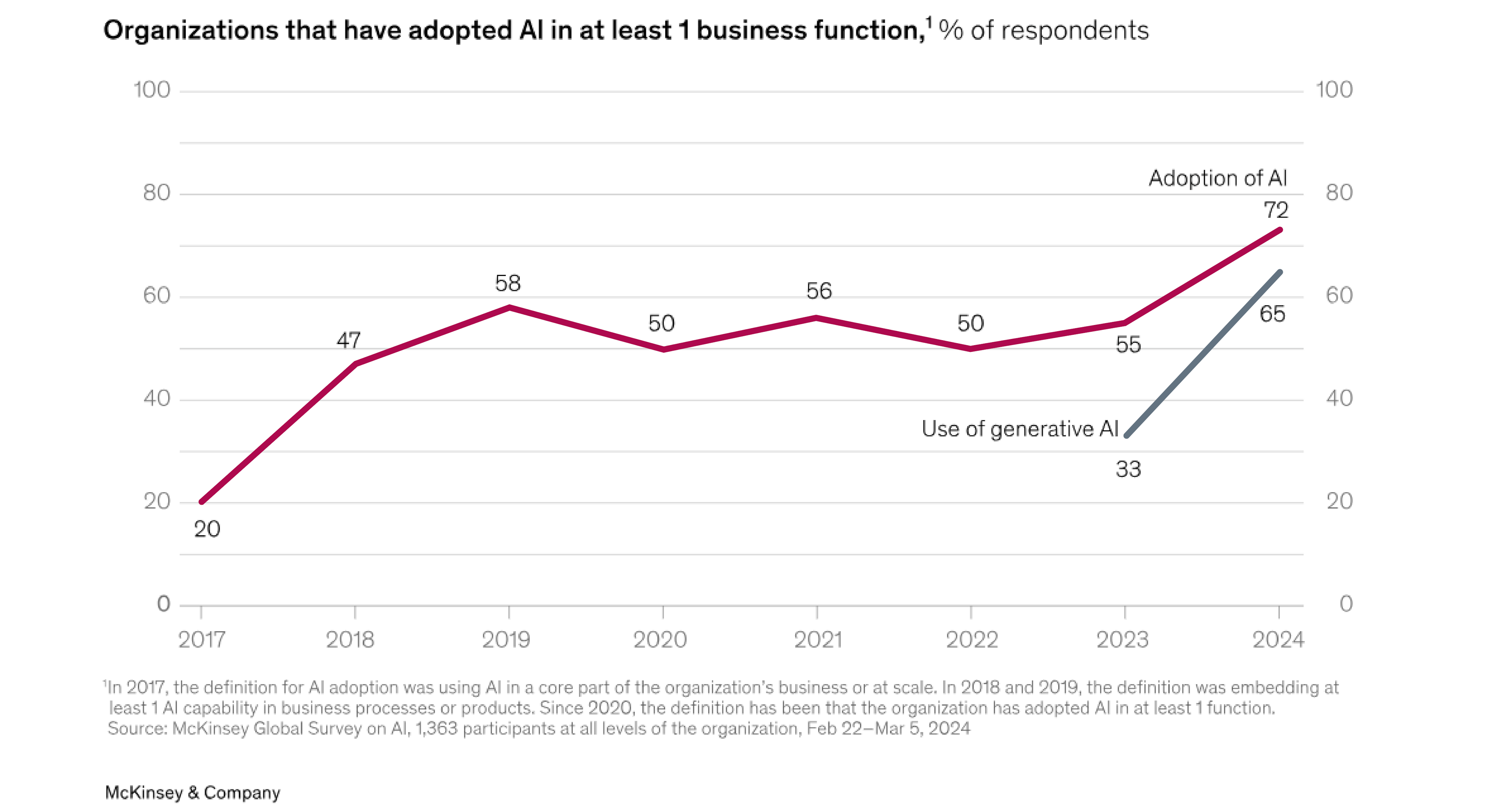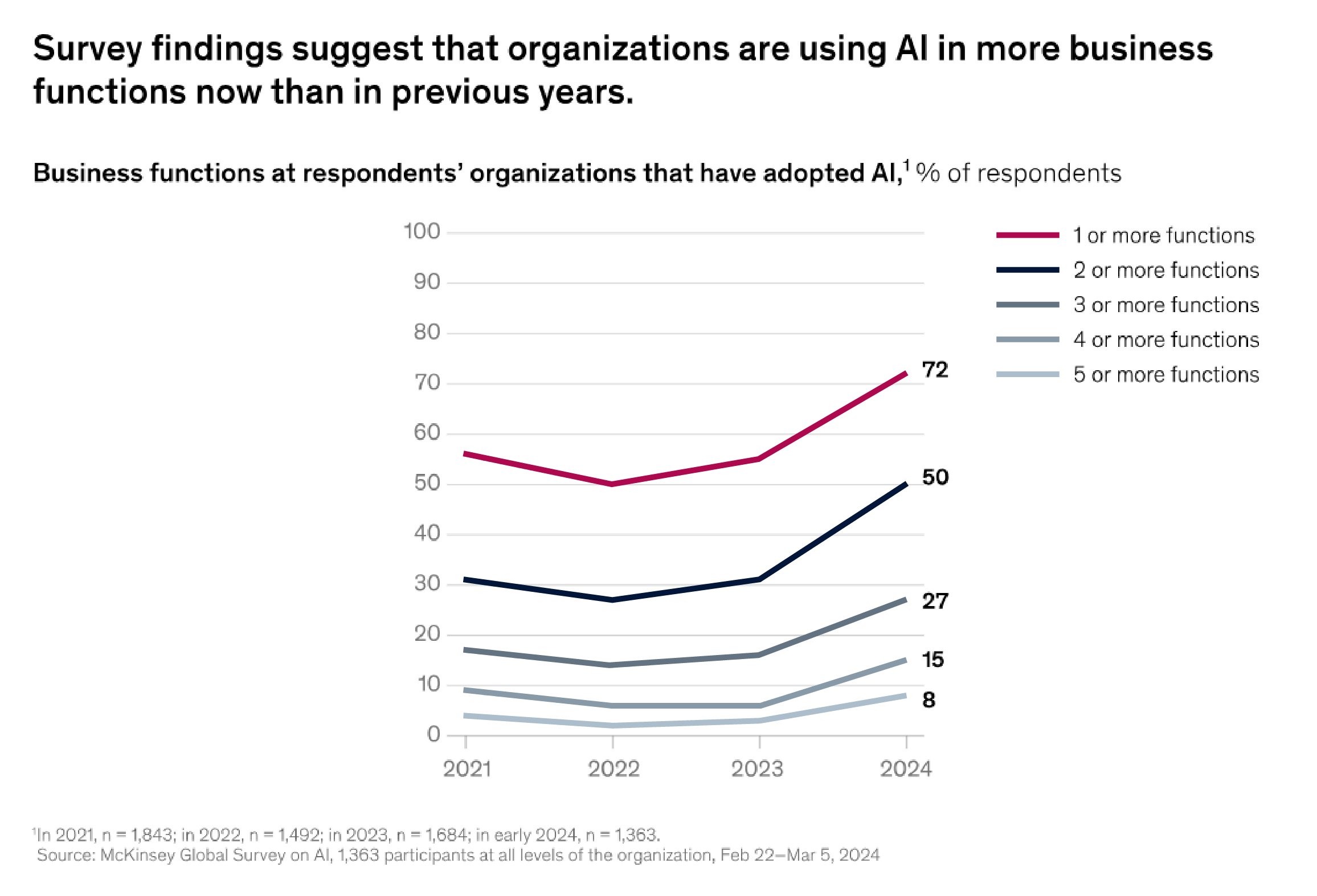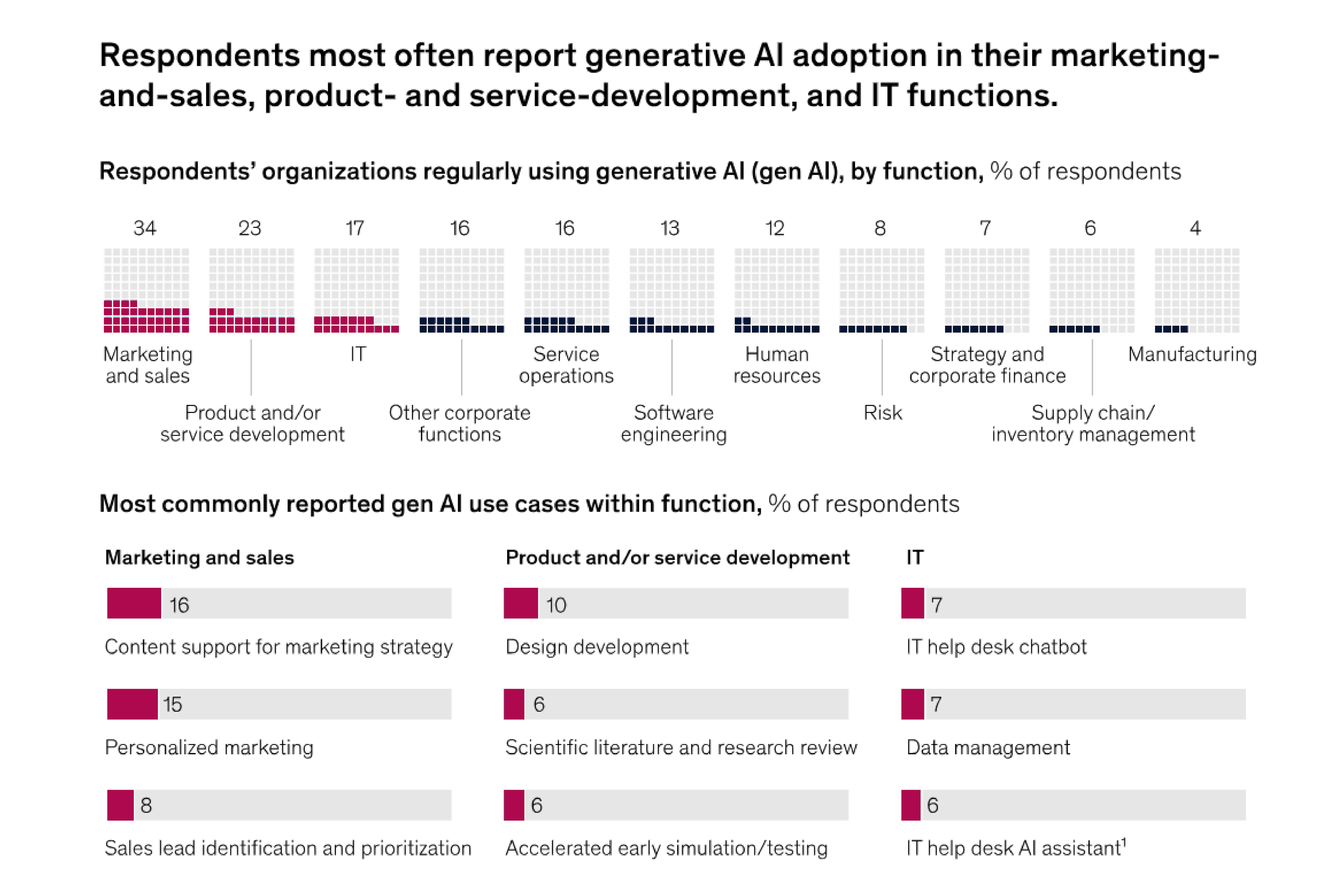
,
Achieving value is the first concern for implementing AI today, with 49% of businesses citing it as a significant barrier. Too often, companies fall for the allure of AI and rush into developing solutions. As a result, the average ROI on enterprise AI is a mere 5.9%.
Here, we’ll explore how to plan and implement AI in marketing to maximize ROI. Although driving ROI with AI isn’t impossible, you’ll need to be strategic about carrying out your specific AI solution.
What is AI Marketing ROI
Despite the vast potential of AI marketing solutions, few companies today are attaining the dream ROI they hoped for. In contrast, 74% of organizations see ROI for Gen AI, and the average is about 6%. This is especially striking given that global AI spending is reaching billions.
A McKinsey report on AI ROI states something more promising, reporting a sales ROI via Gen AI of 10-20%.

Even so, there is still a wide gap between expectations and reality.
Normally, this has been a matter of poor planning and execution. Business leaders get excited about AI without analyzing the best applications for their business.
In particular, companies are keen on triggering custom AI marketing solutions, which can automate operations and personalize customer experiences. AI marketing software plays a crucial role in automating marketing tasks, analyzing customer data, and improving overall marketing strategies. Yet, GenAI can quickly become a vanity technology without the right vision.
Integrating AI for Smarter Marketing Practices
Using AI in marketing transforms how businesses engage with their audiences. Integrating AI into marketing strategies enhances efficiency while it deepens customer insights, allowing brands to deliver more personalized and impactful marketing campaigns. As we stand on the cusp of a technological revolution, the decision to integrate AI into existing marketing frameworks is becoming increasingly critical for companies aiming to maintain a competitive advantage and innovate their approaches.
For decision-makers, the challenge is choosing the right AI marketing tools and ensuring that these technologies harmonize with existing marketing technologies. This guide aims to navigate you through the complexities of evaluating, adopting, and maximizing your AI marketing investment benefits within your marketing strategies, ensuring a seamless transition and optimal return on investment.
We'll explore key considerations for compatibility, address common integration challenges, and highlight strategic steps to ensure that AI fits within your current setup and will enhance it.
Using AI in marketing isn't just about adopting new technologies; it's about integrating these innovations to complement and enhance existing frameworks, driving tangible improvements in marketing efficiency and effectiveness.
AI integration in marketing refers to the strategic incorporation of artificial intelligence technologies to enhance, automate, and optimize marketing strategies. This integration can transform how companies approach everything from customer data analysis and campaign management to content creation and customer service, making processes more efficient and outcomes more effective.
AI technologies like machine learning, natural language processing, and predictive analytics enable marketers to gain deeper insights into customer behaviours, predict future trends, and deliver more personalized content. For instance, AI in data analysis can analyze customer interaction data to identify patterns that inform more targeted marketing strategies or optimize ad placements based on predicted customer behaviours. The relevance of AI in marketing today cannot be overstated; it is fundamentally reshaping the landscape by providing marketers with faster and more intelligent tools.
How Businesses Use AI to Improve Marketing Efforts in 2025
Artificial intelligence (AI) is revolutionizing the marketing landscape by automating and enhancing various tasks and processes. Whether it is about analysing data or engaging with your customers, AI-powered marketing analytics shapes how marketers make decisions and operate, making their efforts more efficient and effective.
One of the primary uses of AI in marketing is predictive analytics. By analyzing vast amounts of customer data, AI algorithms can identify patterns and predict future behaviors. This allows marketers to create highly targeted campaigns that resonate with their audience, ultimately improving conversion rates.
Another significant application is content creation. AI-powered tools can generate high-quality content tailored to specific audiences, such as blog posts, social media updates, and email newsletters. This not only saves time but also ensures that the content is relevant and engaging.
Chatbots are another AI innovation making waves in marketing. These AI-powered assistants can provide customer support, answer frequently asked questions, and help customers navigate websites, all in real time. This enhances the customer experience and frees up human resources for more complex tasks.

In email marketing, AI tools can help create personalized email campaigns that improve open rates and increase conversions. By analyzing customer data, these tools can tailor messages to individual preferences, making each email more relevant and impactful. Incorporating AI marketing tools into your email marketing campaigns can prove to be the last key to effectively leveraging AI technology.
Lastly, social media marketing benefits significantly from AI. AI-powered marketing analytics tools can help marketers create targeted social media campaigns, improve engagement rates, and increase brand awareness. By analyzing social media interactions, these tools can provide insights that inform more effective marketing strategies.
In summary, AI is used in marketing to automate and improve various tasks, from data analysis and customer segmentation to content creation and campaign optimization. By leveraging AI algorithms and tools, marketers can enhance their strategies, improve customer engagement, and achieve better results.
Why Businesses Are Using AI Marketing Tools Today
The integration of AI marketing tools offers a multitude of benefits that can significantly enhance marketing efforts and drive better results.
Here are some of the key advantages:
- Improved Efficiency
AI marketing tools can automate repetitive tasks, such as data entry, social media posting, and email marketing. This automation frees up marketers to focus on more strategic and creative work, ultimately boosting productivity and efficiency. - Enhanced Personalization
AI-based marketing personalization support algorithms that can analyze customer data to provide deep insights into individual preferences and behaviors. This enables marketers to create highly personalized marketing messages that resonate with their audience, leading to improved customer engagement and loyalty. - Increased Accuracy
By leveraging data-driven insights, AI marketing tools help marketers make more informed decisions. This reduces the risk of human error and enhances the overall accuracy of marketing campaigns, resulting in better performance and higher ROI. - Scalability
AI marketing tools can handle large volumes of data and provide insights at scale. This scalability is particularly beneficial for businesses looking to expand their marketing efforts without compromising on quality or effectiveness. - Cost Savings
Automating tasks with AI marketing tools can lead to significant cost savings. By improving efficiency, reducing waste, and optimizing marketing strategies, businesses can lower their operational costs and achieve better results with less investment.
In conclusion, the benefits of using AI marketing tools are manifold. From improved efficiency and enhanced personalization to increased accuracy and cost savings, these tools empower marketers to optimize their strategies and achieve superior outcomes. By integrating AI into their marketing efforts, businesses can stay ahead of the competition and drive sustainable growth.
Are you curious about building your marketing AI agent?
Why Does Business Need an AI Marketing Tool
To ensure your investment in AI marketing tools pays off, it’s essential to approach this domain strategically. After all, 30% of generative AI projects are abandoned because they lack a definite business vision. Identifying the best AI marketing tools available for various business needs and contexts is crucial for optimizing workflows and gaining competitive advantages. Here below is how you can set up your AI project to drive better results.
1. Make Sure, You Know AI's Best Use Cases
First, it’s essential to understand the most effective uses of AI in marketing today. Often, you can boost your AI marketing ROI by selecting a project scope that has already attained proven results from others, leveraging data analytics to make data-driven decisions and automate marketing processes.
Popular areas for AI implementation include customer service (16%), marketing (14%) and sales (12%). Whereas in another study, the top uses were copywriting, simulations, and business process automation.
Overall, AI is a strong possibility for:
- Chatbots and Conversational AI
AI-powered and conversational AI systems simulate human-like interactions that can engage with customers in real time. These tools are critical for marketing activities as they instantly respond to customer queries providing 24/7 customer engagement and improving client satisfaction. They also assist in AI-based lead scoring by qualifying prospects and guiding them through the sales funnel. Additionally, chatbots offer personalized recommendations by analyzing user data, enhancing customer experience, and automating repetitive tasks, which reduces costs and increases efficiency. - Customer Service Operations
AI enhances customer service by automating processes, analyzing feedback, and enabling intelligent decision-making. In marketing, this translates to an improved customer experience through tools like sentiment analysis and natural language processing (NLP), which resolve issues faster. AI also enables feedback analysis, identifying customer pain points to refine marketing strategies. Furthermore, proactive AI-powered support predicts and addresses customer concerns before they arise, fostering trust and loyalty. - Customer Personalization
AI leverages customer data to deliver tailored experiences, products, and messaging. In marketing, this enables hyper-personalized campaigns by analyzing behavior, preferences, and purchase history to create targeted strategies. AI also powers dynamic content, adjusting website elements, emails, and ads in real-time based on user behavior. These personalized experiences lead to higher engagement and conversion rates, making AI a cornerstone of modern marketing. - Predictive Maintenance
AI predicts equipment failures or system issues before they occur, ensuring smooth operations. In marketing, this ensures brand reputation by maintaining uninterrupted service delivery, which builds customer trust. AI’s data-driven insights also forecast market trends and customer needs, helping marketers stay ahead of the competition and adapt strategies proactively. - Data Privacy and Governance
AI ensures compliance with data protection regulations and secures customer data, which is vital for marketing. By promoting trust-building through transparent data practices, AI fosters brand loyalty. It also enables targeted marketing by responsibly using data to create personalized campaigns without violating privacy laws. Additionally, AI mitigates risks by preventing data breaches that could harm a brand’s reputation. - Uptime/Reliability Optimization
AI monitors systems to ensure maximum uptime and reliability, which is crucial for superior marketing operations. This guarantees a seamless customer experience, ensuring websites, apps, and platforms are always available, reducing friction in the customer journey. Reliable systems also enhance brand credibility and provide marketers with real-time data accessibility for informed decision-making. - Predictive Risk Management
AI identifies and mitigates potential risks before they impact operations. In marketing, this helps with crisis prevention by predicting market shifts, customer churn, or campaign failures, allowing marketers to adjust strategies proactively. AI also supports budget optimization by identifying underperforming campaigns or channels, reducing financial risks. Furthermore, it aids in reputation management by monitoring customer sentiment and avoiding PR crises. - Tech Operations Management
AI optimizes technical operations by automating workflows, analyzing system performance, and ensuring smooth integration of marketing technologies. This enhances operational efficiency, allowing marketers to focus on strategy rather than technical issues. AI also provides scalability, enabling businesses to adapt to growing demands and evolving marketing needs without disruptions. - HR Safety and Quality Compliance
AI streamlines HR processes by automating compliance checks and ensuring workplace safety. In marketing, this translates to team efficiency, as AI reduces administrative burdens, allowing HR teams to focus on hiring and retaining top talent. By ensuring compliance, AI protects the brand from legal risks and maintains a positive reputation. - Recruitment Processes
AI revolutionizes recruitment by automating resume screening, candidate matching, and interview scheduling tasks. For marketing teams, this means faster hiring processes ensuring the right talent is onboarded quickly to meet campaign demands. AI also enhances diversity and inclusion by reducing biases in hiring processes and fostering a more innovative and creative marketing workforce.
2. Clarify Company-specific Objectives
Start with a clear business need, especially within your digital marketing strategy. Integrating AI tools within various facets of digital marketing can enhance efficiency, personalize marketing efforts, and streamline processes. Otherwise, you’ll end up with a “shiny object” of little value. Look for areas where your business is most inefficient and draining resources. These are the frontline areas where AI can help the most.

3. Identify Quick Wins for AI ROI
Low-hanging fruit includes areas where AI can make a big difference with little upfront investment. Chatbots for customer service and call centers are a good example. Other quick wins may involve:
- Process Automation
AI-driven process automation uses artificial intelligence technologies to streamline and manage repetitive marketing tasks. Businesses can enhance operational efficiency and reduce human error by automating processes like email marketing, social media posting, and customer segmentation. This allows marketing teams to focus on strategy and creativity, ultimately improving response times and customer engagement while lowering operational costs. - Content Generation
AI-powered content generation utilizes machine learning algorithms to create written, visual, or multimedia content automatically. In marketing, this technology can produce blog posts, product descriptions, social media updates, and personalized email campaigns at scale. By analyzing audience behavior and preferences, AI can generate relevant and engaging content, significantly reducing the time spent on content creation and allowing marketers to maintain a consistent online presence. - Predictive Analytics
Using AI and statistical techniques to analyze historical data and forecast future trends and behaviours. In marketing, businesses can anticipate customer needs, optimize campaigns, and drive decision-making with data-driven insights. By identifying customer interactions and preferences patterns, marketers can create targeted strategies that enhance customer engagement and improve conversion rates while minimizing churn. - Data Analysis
AI enhances data analysis by automating the extraction of insights from large datasets. This enables organizations to understand better customer behavior, preferences, and market trends, in marketing. Marketers can quickly identify correlations and anomalies that inform campaign strategies by leveraging AI algorithms. Enhanced data analysis leads to more informed decision-making, allowing for the creation of highly targeted and effective marketing strategies. - Supply Chain
AI optimizes supply chain management by predicting demand, improving inventory management, and enhancing logistics efficiency. In marketing, a well-managed supply chain ensures that products are available when and where customers want them, directly impacting customer satisfaction. AI-driven insights into supply chain dynamics allow marketers to align promotional strategies with product availability, leading to better sales performance and improved customer experiences. - Employee Experiences
AI plays a crucial role in enhancing employee experiences by automating administrative tasks and providing insights into workforce dynamics. In marketing, improved employee experiences lead to higher morale and productivity, which can translate into more effective marketing efforts. AI tools can facilitate training, performance evaluations, and feedback mechanisms, ensuring marketing teams are well-equipped and motivated to execute campaigns successfully. - Cybersecurity
AI enhances cybersecurity by identifying and mitigating real-time threats, essential for protecting customer data and maintaining trust. In marketing, robust cybersecurity measures safeguard sensitive customer information, allowing businesses to use data-driven marketing strategies without fear of breaches. By utilizing AI to monitor network activity and detect anomalies, organizations can proactively address vulnerabilities and ensure compliance with data protection regulations.
Of course, the right "win" will depend on your business objectives and pain points. Working with an AI partner is essential to identify what's best for your business scenario.
4. Retrofit AI into Current Operations and Culture
Typically, you’ll get top outcomes from AI if you integrate it into your current business. Retrofitting means that you identify areas in your workflows that AI could handle more efficiently, such as through marketing automation, which enhances digital marketing efficiency by streamlining workflows and optimizing campaigns. For example, AI could cut out busy work for your sales team by expanding lead generation and automating outreach.
The same goes for your company culture. AI should empower your teams to do their best work. Ultimately, AI can’t replace critical employee skills such as creativity, relationship building, etc.
5. Invest in a Discovery Process to Validate New Uses
So you have a big idea for AI – congratulations! Now, you should validate it before allocating resources to develop it. Conduct a discovery process with an AI partner to check that the idea is viable and valuable for your business. Utilizing marketing software, such as AI-driven tools, can enhance your marketing efforts through automation, data analysis, and personalization, improving campaign performance and customer engagement. AI experts can enable you to understand your idea’s full implications and costs before you break ground.
6. Conduct a Pilot Project
AI specialists recommend beginning with something small. Doing so will help you get your bearings as you understand AI and embark on developing products with it. Integrating AI tools into your marketing strategy can enhance and streamline marketing efforts, providing valuable insights to inform and refine broader strategies. A pilot project also allows your teams to build rapport with your AI partner, see how the development process works and prepare your internal teams for ongoing change. Additionally, it will give you more accurate information about potential AI ROI before a more significant investment.
7. Invest in Data Readiness
Numerous AI solutions rely on high-quality data. If your company isn't yet gathering, processing and integrating this data into a workable pipeline, you'll want to set this up first. Often, this is easier said than done, but without high data readiness, your business can't reap the benefits of AI.
8. Stay Realistic with AI Budgeting
Estimating costs for AI is notoriously tricky. When budgeting for AI, you'll want to work with a top-rated AI partner who can help you craft the scope and cost of building your solution. Remember that AI may involve a significant upfront investment that takes time to see returns. For example, business leaders report that it takes 14 months to see an AI ROI after implementation.
9. Choose Infrastructure that Enables Easy Iteration
Your tech stack isn't just about what you need today but what it allows for tomorrow. Select infrastructure that gives you the space to improve, innovate and pivot as needed. Iteration is a mainstay of creating value-oriented solutions, so you should select technology that allows you to scale. AI is a constantly evolving technology; your infrastructure should reflect that reality.
10. Use Open-source AI Tools when Appropriate
You've got options when it comes to setting up your AI product. Depending on your scope, you can cut costs by leveraging open-source tools such as TensorFlow, Open AI, and Keras. These could boost your AI ROI in the long run, though you'll want to check the viability with your AI partner.
11. Train Your Users on New AI-supported Processes
As you incorporate AI, don't forget about your people. Tools are only helpful if employees and customers know how to use them properly. To optimize results with AI, consider defining your business' human-in-the-loop workflows. Identify how employees should incorporate AI and train them to use it in their day-to-day responsibilities.
Without training, your teams won't be able to maximize AI and enhance efficiencies. Instead, they may resist the changes and become frustrated with the new technology.
12. Implement Continuous Monitoring Regarding AI for ROI
AI isn't a one-and-done deal. You'll want to monitor it continually to understand what's working and identify tweaks to improve it. Set up ongoing reports on your AI solutions and continuously enhance them. Over time, this will boost your AI ROI and safeguard your product from new challenges.
13. Avoid Jumping on the Bandwagon
It's easy to get caught up with eye-catching AI trends. As AI becomes more powerful, these trends may hold even greater appeal. Remember that AI bells and whistles may not add value to your business.
To effectively move forward with AI, stay strategic and ethical. Define your goals and values as a company. Understand how you can specifically benefit from AI and use it responsibly. A company ethos surrounding AI will become even more critical as legal battles are resolved and consumers look to brands to implement AI ethically.
Conclusion
Integrating AI into marketing is not just a trend; it's a transformative shift that redefines how businesses interact with customers and manage their marketing strategies. AI's profound impact on marketing is evidenced by its ability to automate complex processes, enhance data analysis, and personalize customer interactions at scale. For decision-makers, integrating AI means an opportunity to harness these capabilities, leading to more intelligent, more efficient marketing efforts that can significantly boost your AI marketing ROI.
As you consider integrating AI into your existing marketing technologies, remember that this move is about more than just keeping up with technological advancements—it's about staying ahead in a competitive landscape. AI offers the tools to understand better, anticipate customer needs, and respond to them more effectively.
We encourage decision-makers to embrace these advanced technologies with a strategic approach. Integrating AI marketing tools into your marketing strategies offers immense potential to revolutionize your operations and deliver superior customer experiences. As you move forward, focus on selecting the right AI marketing solutions that align with your business goals and marketing needs.
To move down further where you as a business want to create custom AI marketing solutions to drive your business setting the stage for a more dynamic, responsive, and successful marketing future, you can check out our variety of offerings at Codiste, where we ensure seamless compatibility with current systems and prepare your teams for this digital revamp your business can unlock the full potential of AI marketing tools for the best possible outcomes. Connect with us right now.



What is Agentic AI? A Beginner's Guide to the Future of Software Development
Know more
AI in Customer Service: Trends & Predictions for 2025
Know more
A Deep Dive into How Agentic RAG Automates Data Retrieval and Analysis
Know more
